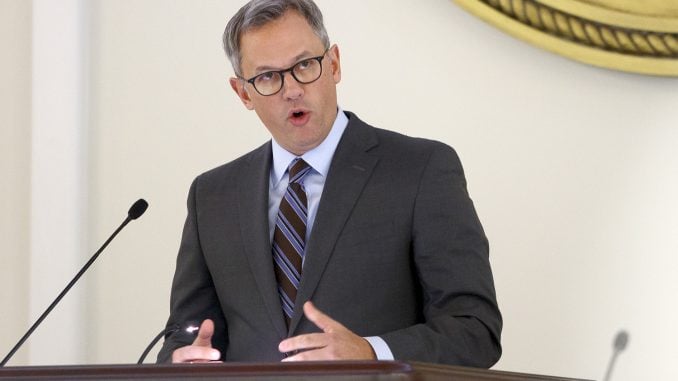
RALEIGH — Last week Republican representatives and senators of the N.C. General Assembly were joined by Lt. Gov. Dan Forest to introduce House Bill 68, also known as the BRIGHT Futures Act. The act aims to clarify rules governing the ability of municipalities and counties to enter into public/private partnerships for communications services such as broadband internet and wireless internet.
The acronym, BRIGHT, represents the fast growing markets lawmakers say the act will stimulate especially in rural areas. BRIGHT stands for: Broadband enabled services; Retail online services; Internet of things; GridPower; Health care, and; Training and education.
“We keep talking about, in this building and across the state, about the urban/rural divide, and we continue to try to come up with programs to make rural counties whole and to help spur development in rural counties,” said Rep. John Szoka (R-Fayetteville), a primary sponsor of the bill. “The piece that’s missing that’s the link to the rest of the world is the internet. Just like roads, a farmer can’t get his products to a market without a road, which is why the government went on big road building sprees back in the ’20s, ’30s, and ’40s.”In further explicating the rules on which kind of relationships municipalities can form with private entities, the bill sponsors hope that rural communities can leverage existing assets to expand internet connectivity and spur economic development and jobs.
Critics have cautioned the state against using taxpayer money to fund “last mile” internet infrastructure programs, but Szoka was adamant the BRIGHT Futures Act is consistent with free market principles and not a government takeover. “Models we’ve had in the past like the Wilson Model, where it was the government providing the service … you’ve got government in direct competition with private enterprise, and I’m not for that,” said Szoka. “The bill is permissive in nature. It further clarifies in our current statutes that broadband services is something that municipal or county government can enter in to a public/private relationship with a private firm.”
While the bill does direct the N.C. Department of Commerce to explore relevant grant programs that could aid municipalities in establishing such partnerships, there is no appropriation of funds attached to the legislation. “The role of government in this, in a public/private partnership, is to provide access to grants and sometimes infrastructure that government or quasi-government already owns,” explained Szoka. “As it currently stands, it’s very unclear that they could do that.”
As an example, Szoka described an electric co-op that already has the necessary infrastructure in place, but only uses a fraction of its capacity. The unused capacity is referred to as “dark fiber,” and under H.B. 68 the co-op could enter a contract with a private company that has a profit incentive to utilize the extra bandwidth and provide last-mile internet services to customer bases that otherwise lack the scale worth investment.
“The primary funding mechanism is the profit motive of private companies wanting to provide a service to people in rural area,” said Szoka. “The solution is going to be different in every municipality and every county.”
The act is not a one-size-fits-all, Szoka said, but allows for free market dynamics to best suit each individual locale. “This isn’t an incumbent bill, this is a pro-free market bill. Let the free market work,” said Szoka. “It’s not anti-business; it’s pro-business. It’s what government does best: allow free enterprise to operate as it is with out government inference.”



